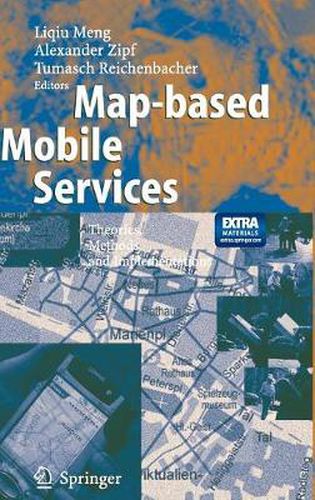Readings Newsletter
Become a Readings Member to make your shopping experience even easier.
Sign in or sign up for free!
You’re not far away from qualifying for FREE standard shipping within Australia
You’ve qualified for FREE standard shipping within Australia
The cart is loading…






This title is printed to order. This book may have been self-published. If so, we cannot guarantee the quality of the content. In the main most books will have gone through the editing process however some may not. We therefore suggest that you be aware of this before ordering this book. If in doubt check either the author or publisher’s details as we are unable to accept any returns unless they are faulty. Please contact us if you have any questions.
The development of wireless telecommunication and ubiquitous computing te- nologies has led to a growing mobile population and dramatically changed p- terns of working and everyday life. A smooth and safe mobility is only possible when the mobile person is well-informed of the happenings in his ambient en- ronments. Location-sensitive maps have proved a strong enhancement to what a mobile user can directly perceive from his ambient environments. Since ancient times the map has been the favorite communication language of spatial infor- tion. It is even more the case for mobile applications where brand-new maps can be wirelessly retrieved or generated in real-time. The upsurge of map-based s- vices on mobile devices has raised a number of new questions challenging the conventional computer-assisted cartography. Map-based mobile services provides a contemporary overview of research and development issues related to the design and the use of mobility-supporting maps. The book has been written for professional cartographers who are striving for - tending their theoretical, methodological and practical knowledge to mobile m- making, for surveyors and geo-service providers involved in the development of intelligent location-based services, for software developers and cognitive scientists engaged in human-computer interaction, and for students and academics in cart- raphy and geoinformation sciences. The book was initiated by the multidisciplinary workshop Design of m- based mobile services within the frame of the conference Human and Computer 2003 - Interaction on the movement held in Stuttgart, Germany, September 2003.
$9.00 standard shipping within Australia
FREE standard shipping within Australia for orders over $100.00
Express & International shipping calculated at checkout
This title is printed to order. This book may have been self-published. If so, we cannot guarantee the quality of the content. In the main most books will have gone through the editing process however some may not. We therefore suggest that you be aware of this before ordering this book. If in doubt check either the author or publisher’s details as we are unable to accept any returns unless they are faulty. Please contact us if you have any questions.
The development of wireless telecommunication and ubiquitous computing te- nologies has led to a growing mobile population and dramatically changed p- terns of working and everyday life. A smooth and safe mobility is only possible when the mobile person is well-informed of the happenings in his ambient en- ronments. Location-sensitive maps have proved a strong enhancement to what a mobile user can directly perceive from his ambient environments. Since ancient times the map has been the favorite communication language of spatial infor- tion. It is even more the case for mobile applications where brand-new maps can be wirelessly retrieved or generated in real-time. The upsurge of map-based s- vices on mobile devices has raised a number of new questions challenging the conventional computer-assisted cartography. Map-based mobile services provides a contemporary overview of research and development issues related to the design and the use of mobility-supporting maps. The book has been written for professional cartographers who are striving for - tending their theoretical, methodological and practical knowledge to mobile m- making, for surveyors and geo-service providers involved in the development of intelligent location-based services, for software developers and cognitive scientists engaged in human-computer interaction, and for students and academics in cart- raphy and geoinformation sciences. The book was initiated by the multidisciplinary workshop Design of m- based mobile services within the frame of the conference Human and Computer 2003 - Interaction on the movement held in Stuttgart, Germany, September 2003.